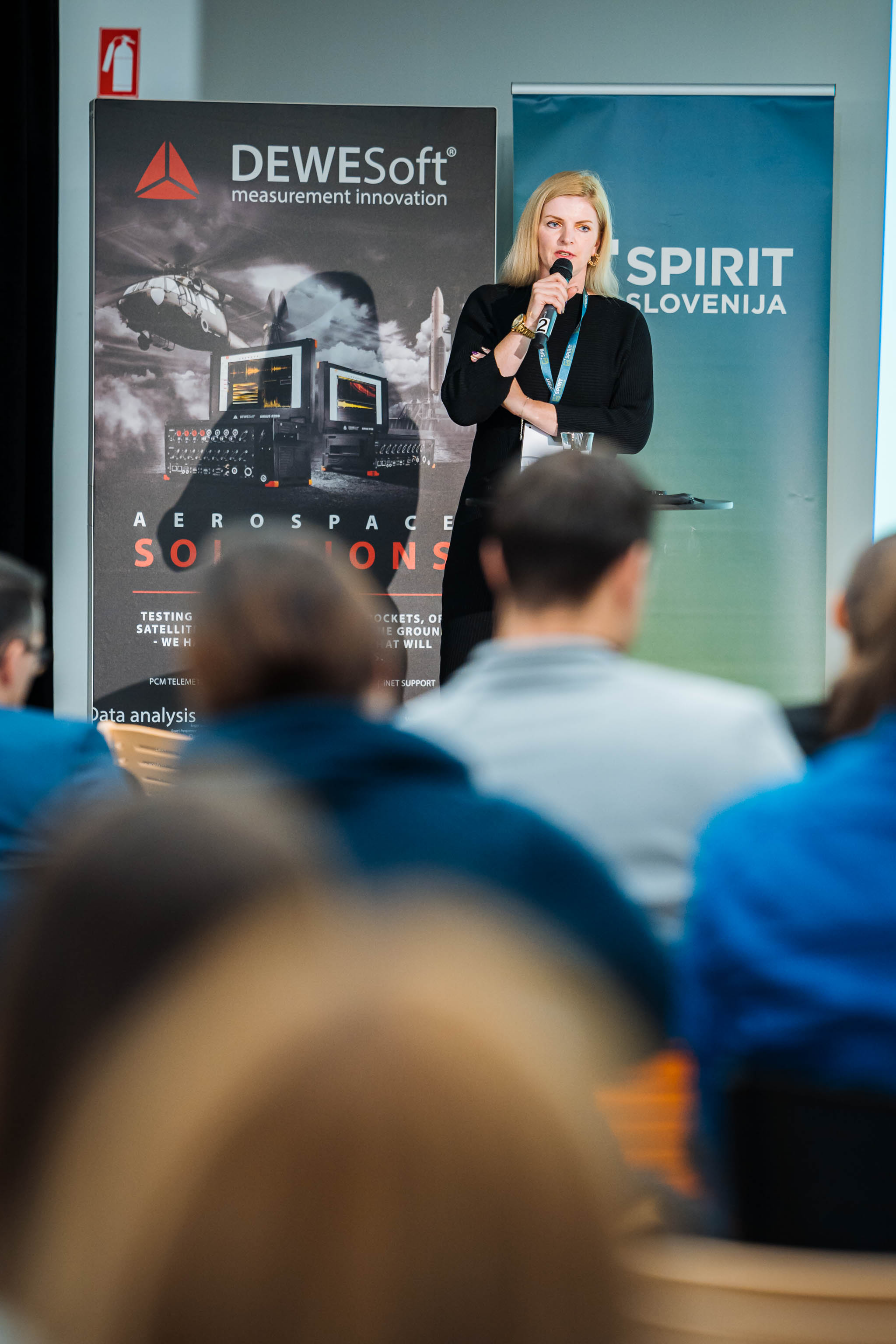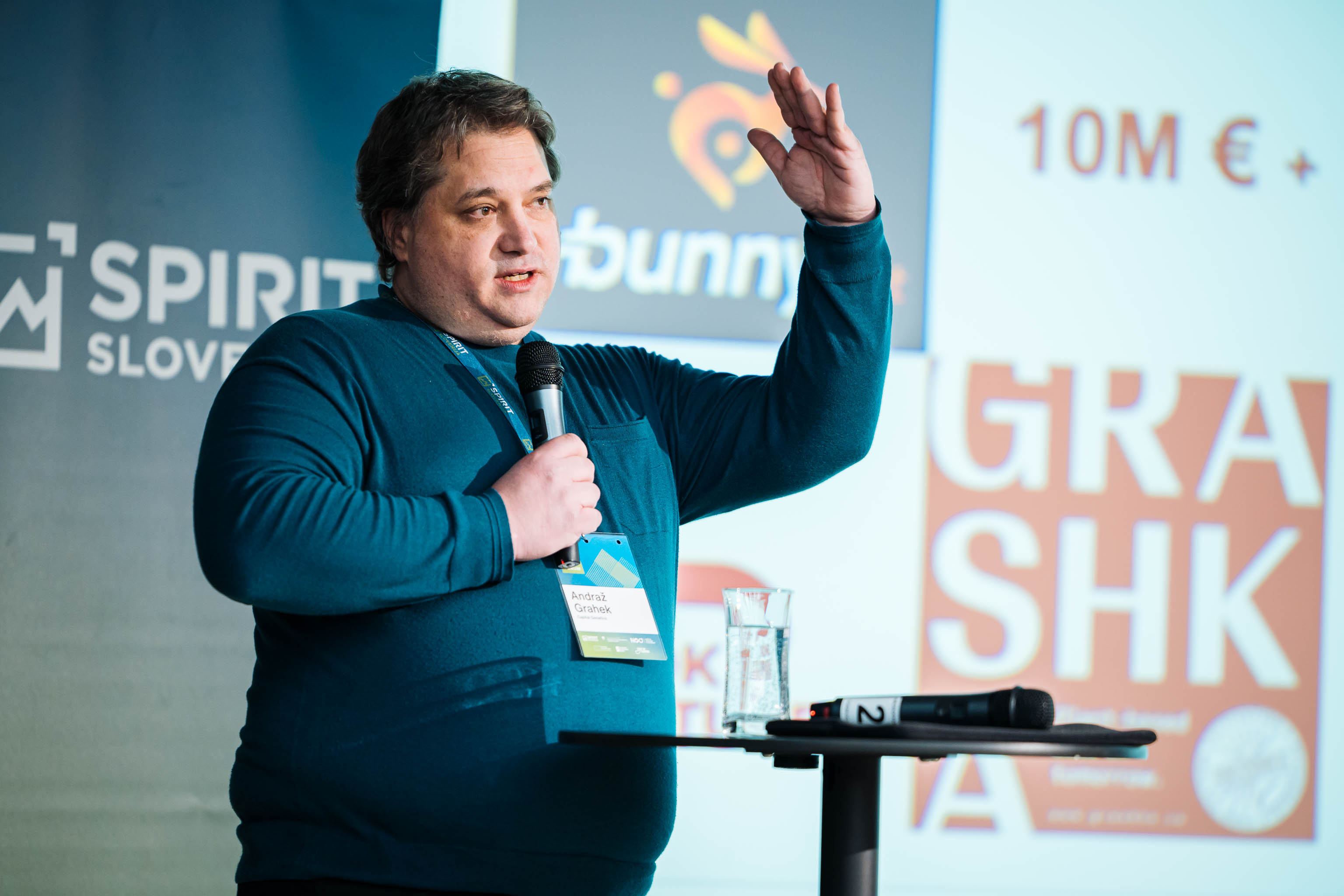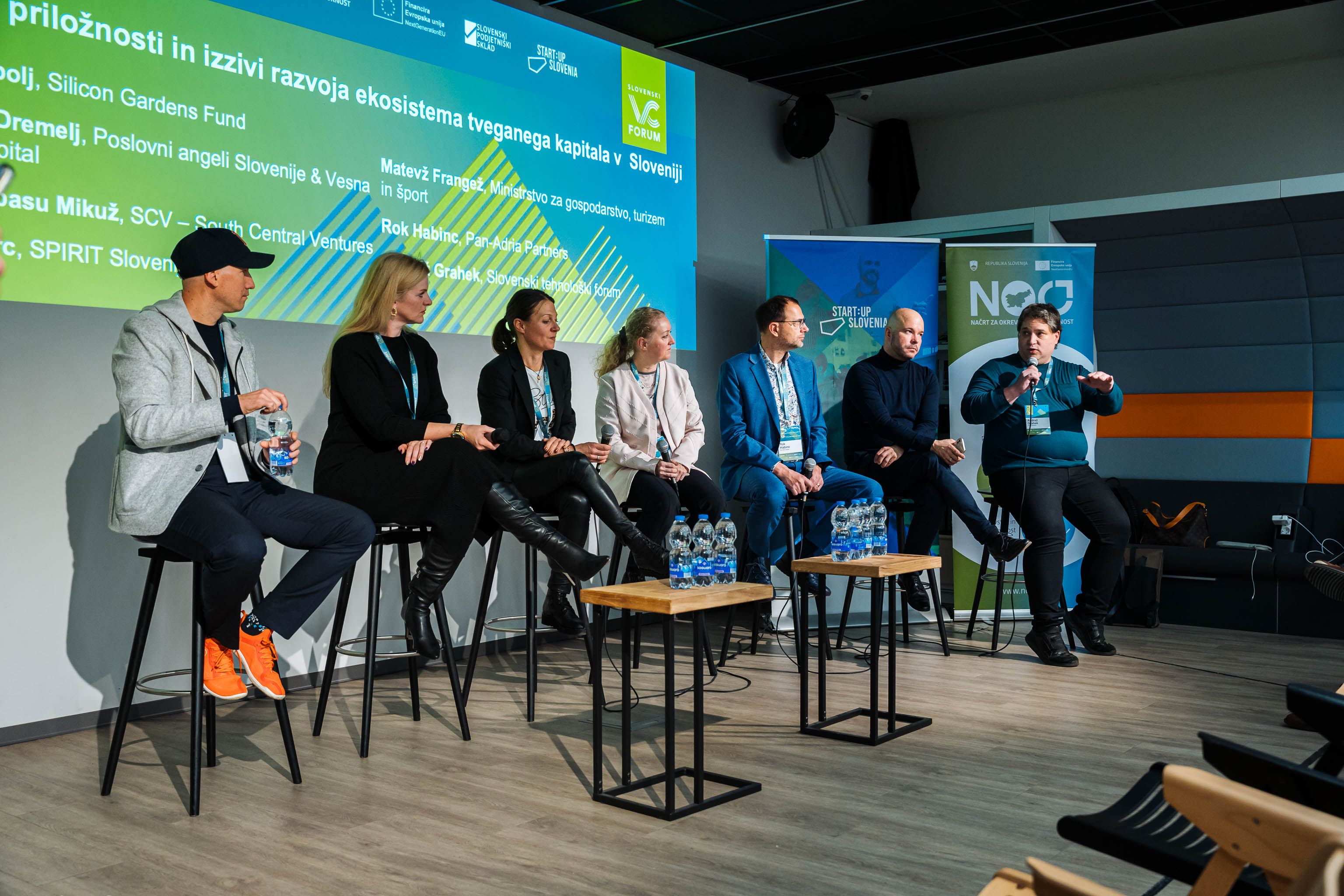Yesterday, the first Slovenian VC Forum took place at Katapult, bringing together key Slovenian venture capital investors and other stakeholders in the Slovenian startup ecosystem. Forum participants were briefed on the latest data and trends in venture capital, compared the Slovenian ecosystem with international standards, shared information on achievements, experiences and plans, and sought solutions to improve the current state of the Slovenian startup ecosystem.
Ministry of the Economy, Tourism and Sport presented a clear vision for the development of the startup ecosystem
Matevž Frangež, State Secretary at the Ministry of the Economy, Tourism and Sport outlined Slovenia's current development position, key challenges and presented an ambitious vision for the future, which was well received by the audience. He sees startups as one of the key pillars for Slovenia's breakthrough and emphasizes the need to consolidate efforts, create an action plan for implementing key solutions following the example of the most ambitious European countries and join them on the path to success. The Ministry will lead the process of defining and implementing solutions in close cooperation with stakeholders in the startup ecosystem.
Frangež said The Ministry has set itself the goal of finalizing priority measures and solutions as soon as possible. He highlighted several government projects that are already addressing the identified problems in the startup environment, including the proposed law on employee profit-sharing, a new reform of labor law recently announced by Prime Minister Robert Golob, and a project to introduce an efficient talent acquisition system. Slovenia aims to become a new European hub for advanced technology development and innovation by taking strategic measures to unlock the hidden potential of the startup ecosystem. This approach will provide more growth opportunities for startups within Slovenia and reduce the need to relocate.
.jpg)
Fostering a supportive startup environment requires specific internationally comparable mechanisms
Irena Meterc, SPIRIT Slovenia, said: "If Slovenia wants to capitalise on the potential of its startup sector for economic progress, it needs to implement globally comparable solutions tailored to the startup and venture capital industry. These aren't the same solutions that are needed for traditional companies in the manufacturing and service sectors. We're talking about specific mechanisms that encourage the creation and development of startup companies."
At the Slovenian VC Forum, representatives of the startup community, the Start:up Slovenia initiative, the Technology Forum, business angels, venture capital funds and government representatives discussed the importance and details of individual mechanisms. The debate focused on the need to create a comparable legal-organizational entity for startups and a mechanism for attracting foreign talent that could quickly obtain a "startup visa".

Key to strengthening the venture capital industry are incentives to invest in venture capital and appropriate systemic solutions to allow access to venture capital for entities such as pension funds and other large institutional investors. Other measures discussed included a greater focus on educating technology talent and the creation of a regulatory sandbox for cutting-edge technologies.
Leading EU countries have already adopted these solutions. The organisation ESNA (European Startup Nation Standards) collects and presents the best practices of startup ecosystems and supports member states in their practical implementation. On the initiative of the Ministry, Slovenia is represented by the Start:up Slovenia initiative, which has also taken over the organization of the Slovenian VC Forum.
In recent years, the Slovenian startup ecosystem has strengthened to form a robust community that proactively proposes globally competitive solutions and impresses with convincing results.
The Slovene Enterprise Fund presented the revamped P2 startup incentive
Participants were also informed about the news of the most popular startup incentive, presented by Nina Urbanič from the Slovene Enterprise Fund: "In 2024, we continue to support innovative young companies with the renewed P2 startup incentive, which will further support companies in their entrepreneurial journey and conquering global markets. In addition to increased subsidy amounts, companies will benefit from a two-day startup training and mentorship to overcome various challenges on their entrepreneurial journey."
Startups create jobs 2 to 3 times faster than average
Slovenian startups and scaleups are becoming increasingly successful in attracting venture capital investment. Slovenia is beginning to establish itself as a major hub for some of the world's most innovative technology entrepreneurs, although there is still significant untapped potential due to existing constraints. In recent years, the gap between Europe and the US in terms of the number of startups and venture capital investment has narrowed, highlighting the role of startups in job creation and value creation. In several European startup hubs analysed by Dealroom, new jobs have grown at an average annual rate of around 10% in recent years, which is two to three times faster than job growth in the broader economy.

At the time of Dealroom and Sifted's report, "The Past, Present and Future of European Tech", European startup companies accounted for 1% of all jobs in Europe. In the US, where startup hubs and venture capital have been around much longer than in Europe, it's estimated that venture-backed startups already create 10% of all jobs. This data is inspiring and points to the hidden potential for new jobs in Europe and Slovenia.
Successful Slovenian tech companies, especially home-grown unicorns, are driving the accelerated development and growth of the ecosystem by attracting top talent from around the world and creating high-quality, high-paying jobs, typically offering salaries 20% higher than the industry average. They also generate a 25% annual return on capital, making them a magnet for additional capital and further investment in the tech ecosystem. By organizing numerous educational events and actively supporting regional conferences such as the PODIM conference, they share their knowledge, experience and best practices to the benefit of individuals and institutions alike.

Slovenia among countries with the lowest venture capital investment per capita
In Slovenia, successful entrepreneurial stories, particularly in software development, are mainly due to an exceptional pool of technological talent in the country. These talents have received support domestically but even more so abroad, as the venture capital environment in Slovenia remains relatively underdeveloped. With €41 of venture capital investment per capita, Slovenia ranks at the bottom of the European countries, below the European average of around €150 per capita and particularly below leading countries such as Estonia, which achieved €1,967 of venture capital investment per capita. It's not surprising, then, that Estonia managed to generate 1,048 startups per million inhabitants, while Slovenia only managed 238, well below the European average of 550 startups per million inhabitants. These relatively poor statistics refer to companies headquartered in Slovenia. However, if we look at startups founded by Slovenian entrepreneurs based abroad, the situation improves significantly, indicating that Slovenians have the capacity to be excellent entrepreneurs.
Ada Guštin Habuš, head of research at Silicon Gardens in "The State of Adria Tech", mentioned, "Between 2021 and 2022, technology companies with Slovenian entrepreneurs raised 1.2 billion euros in capital, which is six times more than the total raised between 2016 and 2017, which amounted to 200 million euros."
The majority of this funding, 57%, came from the US, 40% from other EU countries and only 3% from Slovenia. Looking at the investments received in terms of money, only 14% ended up in companies headquartered in Slovenia. However, in terms of the number of companies involved in the transactions, 76% were companies that remained headquartered in Slovenia. Slovenian entrepreneurs most often establish or relocate their company headquarters to the USA (11%), followed by EU countries (10%) and Asia (3%).

Gregor Rebolj, partner at Silicon Gardens Fund, adds that foreign venture capital investment in Slovenian companies is crucial to ensure sufficient resources for growth and development. However, he's concerned that administrative hurdles make this a challenge for companies established in Slovenia.
As Andraž Grahek, a member of the board of the Slovenian Technology Forum, points out, "We could significantly increase the share of domestic venture capital investment by offering tax incentives to private investors who invest in young technology companies, as Slovenian capital is particularly important in the early stages of a company's development."
Matej Rus, head of the Start:up Slovenia initiative and a lecturer at the Faculty of Economics and Business in Maribor, also stressed the importance of increasing the availability of venture capital: "We need to recognize that venture capital is crucial for the development of startup and scaleup companies. During the Forum, we learned that as many as 82% of unicorns received funding from VC funds, averaging €355 million each. Therefore, we need to work towards increasing the availability of VC resources in Slovenia".
The startup ecosystem awaits a clear decision from the government
Even though some solutions in Slovenia have not been implemented for years, or even decisions have been made that run against the desired results, the Forum participants agreed to create opportunities for the implementation of groundbreaking solutions. In this context, a recent statement by successful lawyer Nejc Novak, who works with numerous regional tech entrepreneurs and venture capital funds and is involved in the most resonant deals in the startup ecosystem, is particularly significant: "Slovenia must first decide whether it wants to become the country where the best European entrepreneurs want to live and build new companies, where European and American investors want to invest, and whether we as a society support or hinder entrepreneurs. We don't seem to have set ourselves the goal of becoming the most desirable business environment in the EU. Until we decide to do so, debating our problems and possible solutions is a waste of time. To help you make this decision, I suggest you read the State of European Tech report, and I invite you to note Slovenia's current insignificance in this context."
Marko Kac of SPIRIT Slovenia said: "The organizers of the Slovenian VC Forum firmly believe that this dialogue is about more than just discussing solutions and that we will actually take a step towards a more startup-friendly society. We have to realize that this is in the interest of our country, our children and our collective prosperity".
13 investors presented their achievements, plans and expectations
At the VC Forum, leading venture capital investors in Slovenia presented their achievements, experiences, and plans. They are: Jure Mikuž from SCV – South Central Ventures, Gregor Rebolj from Silicon Gardens Fund, Nina Dremelj from Business Angels of Slovenia & Vesna Venture Capital, Rok Habinc from Pan-Adria Partners, Igor Milek, Head of the National Contact Point for EIC at SPIRIT Slovenia, Samo Lubej from Prosperita Family Office, Borut Čeh from Labena Ventures, Mark Kalin from ABC Accelerator, Tilen Šarlah from Feelsgood Capital, Peter Merc from Suricate Ventures, Jakob Gajšek from Ruj.VC, and Andraž Grahek from Capital Genetics.

The venture capital sector is developing dynamically, with a significant increase in capital availability and the number of completed and planned investments in Slovenia. The sector could be further strengthened by introducing tax incentives for private investors and by implementing an appropriate pension reform that would allow pension funds to play a greater role in investing in venture capital funds.
During the investor presentations, Igor Milek from SPIRIT Slovenia presented the European Innovation Council's (EIC) offer, from grants to investments. In the last two years, Slovenian startups Biosistemika d.o.o. and ReCatalyst d.o.o. secured a total of €2.9 million in grants. In 2020, startups PlanetCare and MyCol received a total of €2.7 million. Acies Bio, Mesi and PlanetCare also received EIC recognition for the excellence of their projects - the Seal of Excellence. Despite some success stories, there's still plenty of room for improvement, with more than €1.5 billion available in EIC programs each year. Obtaining investment from the EIC fund is particularly challenging due to the strong competition from across Europe.

The event was organized by SPIRIT Slovenia in cooperation with its partners, the Ministry of Economy, Tourism and Sport, the Slovenian Enterprise Fund, the Start:up Slovenia initiative, the scaleup company Chipolo and the accelerator Katapult in Trbovlje. The event was organised in the framework of the Recovery and Resilience Facility, funded by the Republic of Slovenia and the European Union under the Recovery and Resilience Facility, NextGenerationEU.








